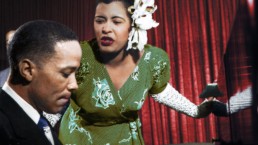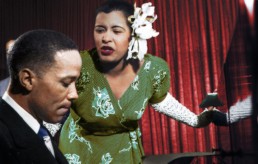‘Billie’ Review: Billie Holiday Doc Reveals the Pain Behind Her Voice
Professionally, Billie was undefeated but personally, she suffered to keep her drug addiction and demons at bay.
Her unique voice could bring grown men down to their knees, and women to tears. But behind her ethereal stage presence and soulful melodies was a deeply unhappy, tortured artist.
Director James Erskine presents a startling exposé about the heartbreaking life and death of legendary Jazz singer, Billie Holiday, in the documentary, Billie (in select theaters and VOD this Friday).
Considered to be “the world’s greatest Jazz vocalist,” Billie Holiday’s story is told through recorded interviews that were discovered and recovered from journalist Linda Lipnack Kuehl, who, in the late 1960s, set out to create the definitive Billie Holiday biography by interviewing her closest friends and associates. However, Kuehl never got the chance to finish her project, as she died under unusual, mysterious circumstances in 1978.
(The question still remains if her prodding and poking into Billie’s past had anything to do with Kuehl’s untimely death, and director James Erskine does little to squash that theory.)
The film’s primary focus, however, is to showcase the interviews and work that Erskine was never able to show herself. Over 200 hours of tapes reveal incredibly intimate testimonies of Holiday’s early years, with family and friends revealing her “fast and loose” lifestyle, her relationship with local pimps and drugs, and even her favorite curse words (“motherfucker” & “cock sucker,” in case you’re wondering).
She wanted to sing how Louis Armstrong played; she wanted her voice to sound like an instrument.
Billie’s rough upbringing was expressed through her music, which oozed with heartache and pain. For as sensitive as she was, Billie never played into the “victim narrative,” even when faced with blatant racist acts like being forced to sleep in the tour van while her white bandmates were allowed to stay in hotels. To say she was a pioneer for racial and gender acceptance is an understatement. The documentary briefly touches on Billie’s bisexuality and her racial rebellion song “Strange Fruit,” both highly controversial topics for the times.
In one pre-recorded interview, Billie, also known as “Lady Day,” shares that she wanted to sing how Louis Armstrong played; she wanted her voice to sound like an instrument. Listening to her now, I think we can all agree that she nailed it.
Professionally, Billie was undefeated. But personally, she suffered to keep her drug addiction and money-grubbing “yes men” at bay. In spite of being one of the highest-paid Black artists of her time, when Billie died in 1959 (at age 44), she only had $750 to her name.
Billie shows parallel tragedies of both a journalist and her subject’s short, tumultuous life. Reminiscent of another legendary musician gone too soon, Amy Winehouse, Billie is a bittersweet showcase of one of the world’s most infamous artists and icons.
Distributed by Greenwich Entertainment, Billie is in select theaters and VOD this Friday, 12/4.
Morgan Rojas
Certified fresh. For disclosure purposes, Morgan currently runs PR at PRETTYBIRD and Ventureland.


